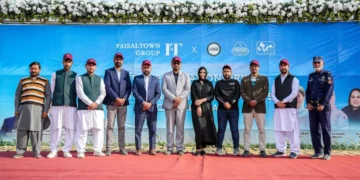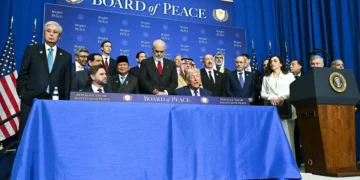Karachi : In a remarkable show of solidarity, the Federation of Pakistan Chambers of Commerce & Industry (FPCCI) – the apex body – and the Korangi Association of Trade & Industry (KATI) have joined hands to make Karachi a business & industry-friendly city again through raising a collective, articulate voice; collaboration in research & development and approaching policy-making forums under the one, unified umbrella of FPCCI.
Mr. Atif Ikram Sheikh, President FPCCI, has apprised that in his detailed, maiden meeting with the delegation of Korangi Association of Trade & Industry (KATI), he has discussed the issues & apprehensions of Karachi’s industry – energy tariffs; prices of industrial plots; key policy rate of the State Bank of Pakistan and neglected micro, small & medium enterprises (MSMEs) sector have been identified as the top issues.
Mr. Atif Ikram Sheikh made it clear that FPCCI considers 22 percent interest rate of the central bank as an absolute bottleneck in the smooth functioning of trade & industry as no industry can operate at that much profitability to be able to pay back such expensive loans. The minimum we want is a regionally-competitive interest rate regime, he added.
Mr. Atif Ikram Sheikh stressed that multiple rounds of unabated upward revisions in the tariffs of electricity and gas has seen cost of doing business of Pakistani industry go up by a large margin; and, we are not at par with the regional countries. This will propel us into a vicious circle of higher cost of doing business; uncompetitive prices in export market; decline in export orders; even wider trade deficit and further strain on foreign exchange reserves, if energy prices are not rationalized, he added.
Mr. Atif Ikram Sheikh proposed that the term of non-filers should be dropped as it is not used anywhere else in the world; and, for practical reasons, computerized national identity card (CNIC) number should be adopted as National Tax Number (NTN) for everyone. There are so many avenues to identify tax evaders; for example, utility bills, international travel, ownership of luxury vehicles, payment of high-end school fees, etc.
Mr. Saquib Fayyaz Magoon, SVP FPCCI, maintained that price of an acre of land in industrial zones has climbed up to PKR.300 – 350 million; and, no new industry can be set up at this type of capital expenditure. The same goes for the expansion plans of the existing industries, he added.
Mr. Saquib Fayyaz Maggo also pointed out that drug regulatory authority of Pakistan (DRAP) should shun their high-handed approach; and, immediately start a consultative process with the pharmaceutical manufacturers to upwardly rationalize retail prices of the life-saving drugs. Due to inaction of DRAP many life-saving drugs are short in the market and it is giving a push to smuggled medicines, he added.
Mr. Zubair Chhaya, Deputy Petron-in-Chief KATI, reiterated that representation of small & medium enterprises is of an utmost importance; and, need of the hour is to establish clusters for them to establish cottage, small and medium enterprises on the lines of industrial zones. SMEs are, in fact, an integral part of the supply and sourcing lines of the export-oriented industries; therefore, the federal & provincial governments should facilitate them with the provision of land.
KATI delegation expressed their dire concerns that the introduction of section 7-Ein the income tax ordinance (ITO 2001); which is applicable from the tax year 2022; has further increased the notice manufacturing practices of FBR and making taxpayers, law-abiding citizens having sleepless nights.
Ms. Nighat Awan, Acting President KATI, pointed out that there are FBR reforms in the pipeline; and, the business community as a whole must act fast to get themselves onboard of the reforms committee to make sure that these reforms are not carried in a consultation-less manner.



















